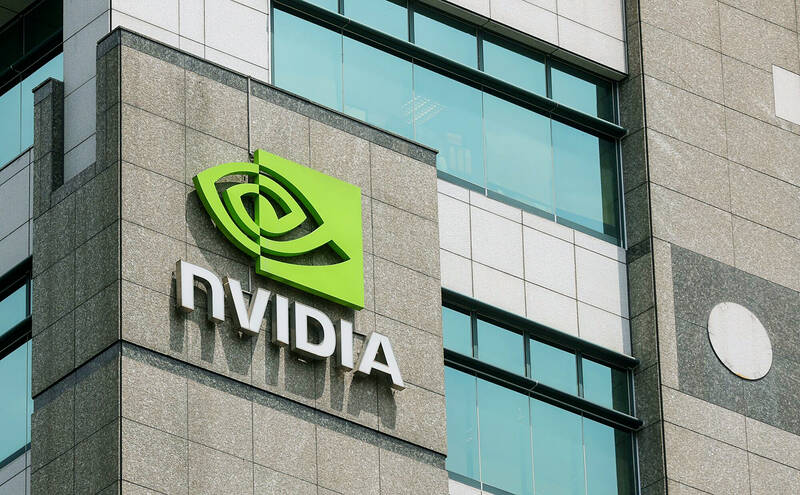While Nvidia Corp shares have roughly tripled this year, those that the company relies on to produce the chips at the heart of the artificial intelligence (AI) frenzy have yet to see such stellar rewards.
Taiwan Semiconductor Manufacturing Co (TSMC, 台積電), which makes most, if not all, of the chips designed by Nvidia, is showing a more modest 30 percent gain.
ASML Holding NV, whose extreme ultraviolet lithography (EUV) systems are essential in the production process, is up 27 percent.

Photo: Bloomberg
The contrast in performance reflects Nvidia’s position as the most immediate beneficiary of the demand for technology that powers AI applications. For TSMC and ASML, any gains will be longer term, while in the short run, much of their vast client bases are being hit hard by a slump in global chip demand.
These factors are reflected in estimates of adjusted earnings per share. Over the past six months, analysts have raised current-year forecasts for Nvidia by 77 percent, data compiled by Bloomberg showed.
In the same period, estimates for TSMC were trimmed by 15 percent, while those for ASML held steady.
Nvidia is “expensive for a reason,” said Richard Clode, a portfolio manager with Janus Henderson. “You’ve ultimately got to see upside to earnings and profit forecasts. That’s the only thing that sustainably keeps stocks higher, and the only company we are seeing at the moment is Nvidia.”
Nvidia’s market capitalization has surged past the US$1 trillion mark without a pause, taking the firm’s value beyond that of ASML and TSMC combined.
It is now twice as big as ASML, having been worth less as recently as January, and four times larger than TSMC.
Earlier this month, TSMC tempered its annual spending budget, a blow for its equipment supplier ASML, whose quarterly order intake has slumped to the lowest level since 2020.
Trading at 50 times estimated annual earnings, Nvidia is the second-most expensive among profitable members of the Philadelphia Semiconductor Index, leaving TSMC and ASML far behind.
Heightened tensions between Taiwan and China, which motivated Berkshire Hathaway’s Warren Buffett to close out his position in TSMC, have worked against the Taiwanese chipmaker’s valuation.
A US-led effort to restrict China’s access to semiconductor technology has also hit ASML, as the Netherlands readies export curbs on some of its advanced machines.
“The geopolitical side is something that has to be factored into valuation,” Deepwater Asset Management LLD cofounder and managing partner Gene Munster said.
While analysts have increased estimates of Nvidia’s forward adjusted earnings per share by 79 percent in the past six months, those for TSMC and ASML have fallen.
Even though TSMC is the sole maker of Nvidia’s AI processors, its revenue might see only a low single-digit percentage boost in the short term, Sanford C. Bernstein & Co analysts led by Mark Li said.
That is because Nvidia’s processors account for a small portion of TSMC’s revenue and capacity for packaging these chips is tight.
For ASML, boosts from generative AI would not come until 2025, Societe Generale SA analyst Alexander Peterc said.
It takes more than a year for the Dutch firm to fulfill an order for the EUV equipment that is indispensable to producing the most cutting-edge chips.

Intel Corp chief executive officer Lip-Bu Tan (陳立武) is expected to meet with Taiwanese suppliers next month in conjunction with the opening of the Computex Taipei trade show, supply chain sources said on Monday. The visit, the first for Tan to Taiwan since assuming his new post last month, would be aimed at enhancing Intel’s ties with suppliers in Taiwan as he attempts to help turn around the struggling US chipmaker, the sources said. Tan is to hold a banquet to celebrate Intel’s 40-year presence in Taiwan before Computex opens on May 20 and invite dozens of Taiwanese suppliers to exchange views

Application-specific integrated circuit designer Faraday Technology Corp (智原) yesterday said that although revenue this quarter would decline 30 percent from last quarter, it retained its full-year forecast of revenue growth of 100 percent. The company attributed the quarterly drop to a slowdown in customers’ production of chips using Faraday’s advanced packaging technology. The company is still confident about its revenue growth this year, given its strong “design-win” — or the projects it won to help customers design their chips, Faraday president Steve Wang (王國雍) told an online earnings conference. “The design-win this year is better than we expected. We believe we will win

Chizuko Kimura has become the first female sushi chef in the world to win a Michelin star, fulfilling a promise she made to her dying husband to continue his legacy. The 54-year-old Japanese chef regained the Michelin star her late husband, Shunei Kimura, won three years ago for their Sushi Shunei restaurant in Paris. For Shunei Kimura, the star was a dream come true. However, the joy was short-lived. He died from cancer just three months later in June 2022. He was 65. The following year, the restaurant in the heart of Montmartre lost its star rating. Chizuko Kimura insisted that the new star is still down

While China’s leaders use their economic and political might to fight US President Donald Trump’s trade war “to the end,” its army of social media soldiers are embarking on a more humorous campaign online. Trump’s tariff blitz has seen Washington and Beijing impose eye-watering duties on imports from the other, fanning a standoff between the economic superpowers that has sparked global recession fears and sent markets into a tailspin. Trump says his policy is a response to years of being “ripped off” by other countries and aims to bring manufacturing to the US, forcing companies to employ US workers. However, China’s online warriors